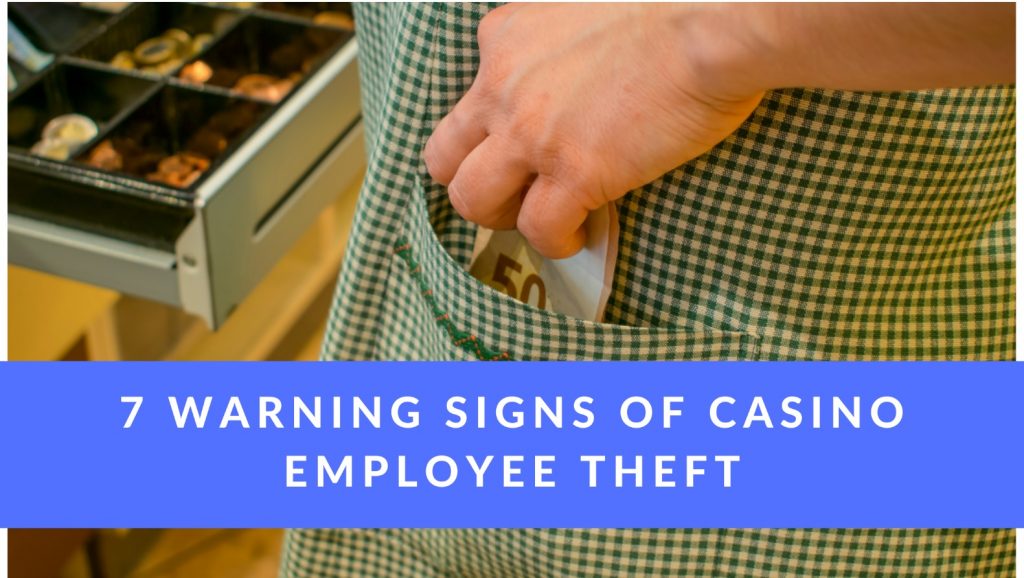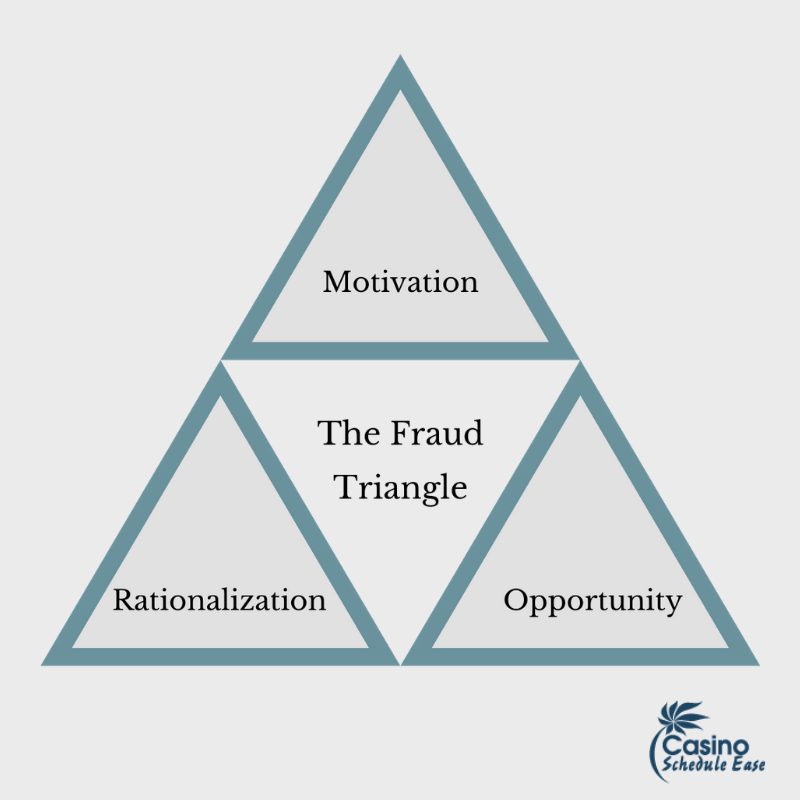
How to Spot Employees Who Have a Higher Chance of Stealing
Casino employee theft is a major problem in the gaming industry. Estimates have found that 5-7% of revenue is lost to theft every single year. That’s a huge amount of money to lose for nothing. If you can figure out how to reduce or eliminate employee theft, it will make a huge difference in your net profits. You should start by learning how to spot the warning signs of an employee who may be prone to stealing.
In many ways, it is the smaller casinos that get hurt even more from employee theft. Across all industries, 33% of business bankruptcies happen because of employee theft. Therefore, learning to spot employees who may have a higher chance of trying to steal from you isn’t just gratifying, but good business.
You begin by understanding why employees steal in the first place, from any business.
Why Casino Employees Steal
Global Gaming and Business Magazine explained the driving forces for casino employee theft in terms of a triangle – the fraud triangle.

The potential for theft greatly increases the more parts of the triangle are in play. The three aspects of the fraud triangle are:
- Motivation for stealing – the reasons employees do it despite the risks
- Rationalization – how they convince themselves their actions are justified
- Opportunity – the ease with which they believe they can get away with it
The third part of the triangle – opportunity – is the piece of the triangle you have the most ability to combat. You can’t do much about rationalization, but being aware of how employees justify their thefts helps you spot possible culprits, as you’ll see in a bit.
As for motivation for why employees steal, GGB boils this down to the 4 B’s – beer, boobs, betting, and borrowing. In other words, substance addictions, sexual deviancy and addictions, gambling, and perceived or real financial desperation.
Here’s an example of some economic rationalizations for casino employee theft: In a down economy, desperation increases. People justify theft because they “need” the money. In good times, casinos are very busy, and opportunity increases because it’s easier to hide in the bustle of the crowds. And employees will rationalize theft this time because since your business is making so much money, you can afford to lose a little extra and no one gets hurt.
Warning Signs Your Employees Are at Risk of Turning to Theft
These 7 warning signs are where you begin to combat casino employee theft. Look for these behaviors among your staff – and not just your low-level employees. As you’ll see in a bit, managers and supervisors can fleece you too.
1. Territoriality
Have you ever re-assigned an employee to a new task or
department, or changed their routine in some way, even an insignificant one? An employee who is scamming you will resist these kinds of changes, often vehemently.
They will lie about the reasons why your changes upset them, because the real reason is that these changes will mess up their little operation. Watch out for employees who hoard their duties and tasks and resist any changes to processes and systems.
2. Living well beyond their means
You know what you’re paying people. If a guy making $50k per year is driving around in brand new luxury cars, wearing $5000 watches, and always has a well-dressed lady by his side, something might be off.
3. Financial complaints and difficulties
Employees who frequently complain about financial trouble will be more likely to take advantage of an opportunity to steal if they see it. Desperation is a primary motivation that leads to rationalization. (See how that triangle works?).
Be on the lookout for employees frequently complaining about their finances.
4. Refusing vacation time
This is especially true in your bookkeeping and accounting departments, but also your table games, money counting, and other areas. If an employee has a scam going and knows how to hide it, being gone for a week or two and having a temporary person replace them risks having their scam discovered.
Employees who never take vacations, or who always cash out their vacation time, are ones to keep your eyes on.
5. Reluctance to train, delegate, or share duties
This is another form of territoriality. An employee who is stealing doesn’t want to train anyone new because that person will probably discover their scam. Delegating tasks that are critical to their coverup causes the same risks, as does newly sharing duties they used to do on their own.
This is one way to fight employee theft. Change your systems and processes now and then, and see who gets the angriest about it. If their reasons don’t quite make sense, take a closer look at whatever they have control over. It is actually your longer-term employees who are more likely to consider stealing, because they will learn to spot the holes and gaps – the opportunities.
6. Too cozy with vendors or customers
Many casino theft situations involve non-employees. Vendors are a prime source for theft, because both parties can agree on the scheme and work together to falsify the paperwork. Keep an eye on any casino employees who just seem a bit too friendly with non-employees.
7. Family problems
Divorce is expensive. Family-related medical or legal costs, or education expenses, can be crippling. The stress from these expenses will motivate some employees to try to cover the costs using your profits.
And let’s be clear: Many warning signs on this list can occur for all kinds of reasons. No one is guilty simply because they have family trouble. People can refuse vacations for all kinds of reasons. System changes can truly make someone’s work harder and it isn’t wrong to complain about that.
But security experts have seen these issues crop up repeatedly in employee fraud cases. If you want to head off employee theft before it costs you, keep your eyes and ears tuned to these warning signs.
How Many Thieving Casino Employees Have Prior Records?
A large and detailed study that looked into employee theft across multiple industries found that only 5.2% of employees who steal had prior records, and only 8.3% had been previously fired for theft.
While that may be surprising, the fact remains that the vast majority of employees who steal are first-time offenders.
That’s why figuring out how to systemically monitor for these seven warning signs is so important. You want to dissuade employees from making bad decisions – things they have probably never done before.
Types of Scams Run By Casino Employees
Any employee with access to your computer systems who also can convert points, reward, or chips for cash has a greater opportunity to steal. They can do things like generate replacement player cards for themselves and their friends, and cash the points. Others can create multiple accounts to get free play money.
Managers who have access to drop box storage rooms have been found pre-counting cash before the count team arrives. If that manager also controls surveillance, they have a higher chance of success. Again – opportunity.
Scheming dealers can pay out money to their friends even for losing hands.
Other scams, as mentioned earlier, will involve vendors, such as rewarding contracts to someone in exchange for a kickback, over-billing, and other methods of skimming cash. Here’s an article with more types of casino theft scams caught by security and law enforcement.
Real Examples of Casino Employee Theft
There are countless stories of casino employee theft to be
found online and in the news. But each one offers another glimpse into the methods and the motives for how and why employees might try to steal from your casino.
This casino theft involved an employee who printed false vouchers, and got away with $14,500 before getting caught.
Here’s a huge scheme involving eight people that netted $5.2 million before they got caught.
In this one, two table game staff stole an unknown amount of money, and got sued by the casino’s insurance company for over $800,000.
And here are two casino thefts masterminded by higher ranking employees, a slot supervisor in one case, and a VP of player development in the other. These cost the casino tens or hundreds of thousands in losses.
There is plenty more where these came from.
The point is – yes, you should be focusing your security on preventing customer thefts. But your employees need to be watched too, because they actually have far more opportunity to steal than your customers do. If they get motivated past the breaking point by any of the 4 B’s, it won’t be long before they rationalize whatever thieving schemes they dream up and decide to try it, despite the risks. The Nevada Gaming Control Board says that about 20% of their arrests are casino employees.
What Can You Do to Minimize Employee Theft from Your Casino?
See 10 strategies for combatting casino employee theft
